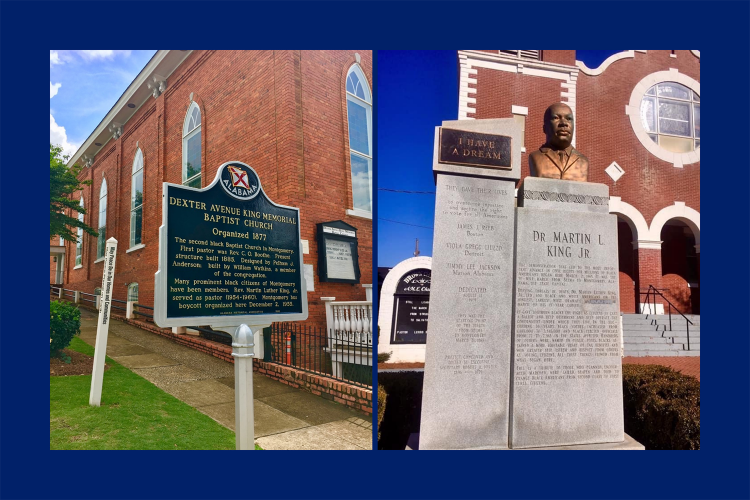New Duke Travels Trip Will Take Alumni on a Civil Rights Journey Through Alabama This March

Alabama, the state known as the cradle of the Confederacy, set the stage for some of the most important moments in civil rights struggle.
Now Duke Travels, the travel program for Duke alumni and friends, will take alumni and friends through key stops that were central to the Civil Rights Movement—Montgomery, Selma, Tuskegee and Birmingham—during the six-day trip from March 7-12, 2022. The trip is open to Duke faculty and staff.
“Participants will have the special opportunity to speak first-hand with veterans of the struggle, many who have worked tirelessly to preserve this important cultural heritage,” says Beth Ray-Schroeder, senior director of Duke Travels.
An unusual feature of Duke Travels programs is being led by a Duke faculty member. Mark Anthony Neal, the James B. Duke Distinguished Professor of African and African American Studies, will lead “A Civil Rights Journey,” and guide learning and reflection during the trip.
 A few highlights include:
A few highlights include:
- Montgomery: Participants will stay in the heart of Montgomery’s historic district, where they will tour the Freedom Rides Museum, the Montgomery Museum of Fine Arts, the Rosa Park Museum and Dexter Avenue King Memorial Baptist Church, where Dr. Martin Luther King Jr. was pastor during the Montgomery Bus Boycott. In addition, they will learn about the importance of the music and spirituals and attend a concert at the Bricklayer’s Hall, the home to the Montgomery Improvement Association (MIA) and the Montgomery Bus Boycott offices.
- Selma: Travelers will take in Selma with local foot soldier and author T. Dianne Harris, as well as activist and speaker Joyce O’Neal. At Brown Chapel AME Church, the pair will share their experiences as teenage foot soldiers during the 1965 Voting Rights Demonstrations. Brown Chapel served as headquarters for the Southern Christian Leadership Conference (SCLC) during the 1965 Voting Rights Campaign. The Selma tour closes with the retelling of the March 7, 1965 police attack on Civil Rights demonstrators as they walked across the Edmund Pettus Bridge.
- Birmingham: Guests will visit the city King once described as “probably the most thoroughly segregated city in the United States.” He and the Southern Christian Leadership Conference (SCLC) were invited to join the campaign in Birmingham to integrate the downtown shopping and government district along with institute fair hiring practices in employment, the reopen public parks (closed to Black integration) and the create a biracial committee to oversee the desegregation of Birmingham’s public schools. In addition, participants will visit the Birmingham Civil Rights Institute (BCRI), an impressive educational and interactive museum, and the 16th Street Baptist Church, where on Sunday, Sept. 15, 1963, four black girls were killed when the church was bombed by the Ku Klux Klan. The church was a meeting-place for Civil Rights leaders such as King, Rev. Ralph David Abernathy, and Rev. Fred Shuttlesworth.
- Montgomery: Travelers head back to Montgomery to visit the National Memorial for Peace and Justice, a public site conceived by the Equal Justice Initiative (EJI). The non-profit EJI was founded in 1989 by Bryan Stevenson, a lawyer and social justice activist. “You can spend hours there,” Ray-Schroeder says.
- Tuskegee: The final day of the trip will be a half a day in Tuskegee, another historic site along the Civil Rights Trail. Participants will spend time at Tuskegee University, formerly known as Tuskegee Institute which was founded as a school for African American teachers in 1881. Booker T. Washington, a slave who rose as one of the most influential black leaders of his time, founded the school. Participants will also take in the Tuskegee Airmen Historic Site commemorating the contributions of African American aviators of World War II.
For more information, contact duketravels@duke.edu or call (919) 684-2988.